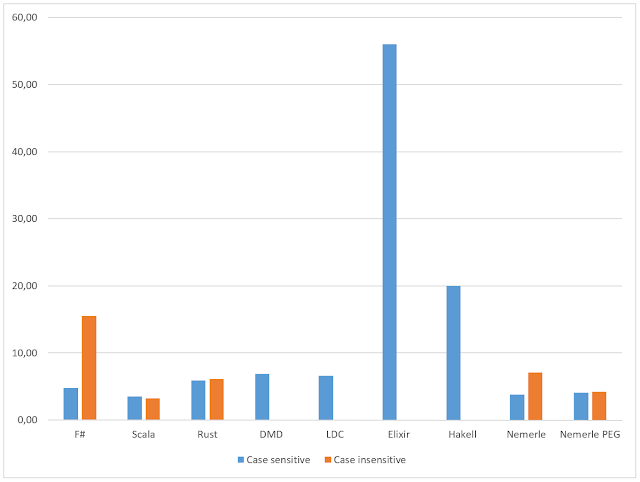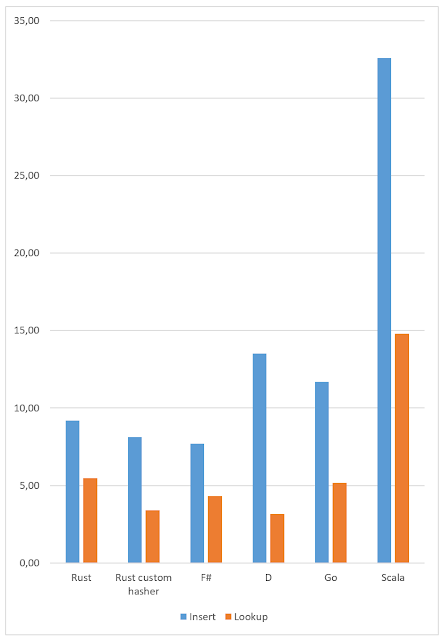Upcoming F# struct tuples: are they always faster?
Don Syme has been working on struct tuples for F# language. Let's see if they are more performant than "old" (heap allocated) tuples in simple scenario: returning tuple from function. The code is very simple:
Decompiled code in Release configuration:
Everything we need to change to switch to struct tuples, is adding "struct" keyword in front of constructor and pattern matching:
Decompiled code in Release configuration:
I don't know about you, but I was surprised with those results. The performance roughly the same. GC is not a bottleneck as no objects were promoted to generation 1.
Conclusions:
- Using struct tuples as a faster or "GC-friendly" alternative to return multiple values from functions does not make sense.
- Building in release mode erases away heap allocated tuples, but not struct tuples.
- Building in release mode inlines the "foo" function, which makes the code 10x faster.
- You can fearlessly allocate tens of millions of short-living object per second, performance will be great.





Comments
[CompilationMapping(SourceConstructFlags.Module)]
public static class Program
{
[EntryPoint]
public static int main(string[] _arg1)
{
Stopwatch stopwatch = Stopwatch.StartNew();
for (int index = 1; index < 100000001; ++index)
Math.Sin((double) index / 1000.0);
stopwatch.Stop();
PrintfModule.PrintFormatLineToTextWriter>(Console.Out, (PrintfFormat, TextWriter, Unit, Unit>) new PrintfFormat, TextWriter, Unit, Unit, TimeSpan>("Run: %O")).Invoke(stopwatch.Elapsed);
stopwatch.Restart();
GC.Collect(2);
stopwatch.Stop();
PrintfModule.PrintFormatLineToTextWriter>(Console.Out, (PrintfFormat, TextWriter, Unit, Unit>) new PrintfFormat, TextWriter, Unit, Unit, TimeSpan>("GC.Collect: %O")).Invoke(stopwatch.Elapsed);
Console.ReadKey();
return 0;
}
}
I compiled in Release configuration the variant which uses struct tuples and they _are not eraised_:
[EntryPoint]
public static int main(string[] _arg1)
{
Stopwatch sw = Stopwatch.StartNew();
for (int i = 1; i < 100000001; i++)
{
double num = (double)i / 1000.0;
StructTuple structTuple = new StructTuple(num, Math.Sin(num));
}
sw.Stop();
PrintfFormat, TextWriter, Unit, Unit> format = new PrintfFormat, TextWriter, Unit, Unit, TimeSpan>("Run: %O");
PrintfModule.PrintFormatLineToTextWriter>(Console.Out, format).Invoke(sw.Elapsed);
sw.Restart();
GC.Collect(2);
sw.Stop();
format = new PrintfFormat, TextWriter, Unit, Unit, TimeSpan>("GC.Collect 2: %O");
PrintfModule.PrintFormatLineToTextWriter>(Console.Out, format).Invoke(sw.Elapsed);
ConsoleKeyInfo consoleKeyInfo = Console.ReadKey();
return 0;
}
Giaonhan247 chuyên dịch vụ ship hàng mỹ từ dịch vụ nhận mua hộ hàng mỹ từ trang ebay vn cùng với dịch vụ mua hộ hàng mỹ về VN uy tín, giá rẻ.